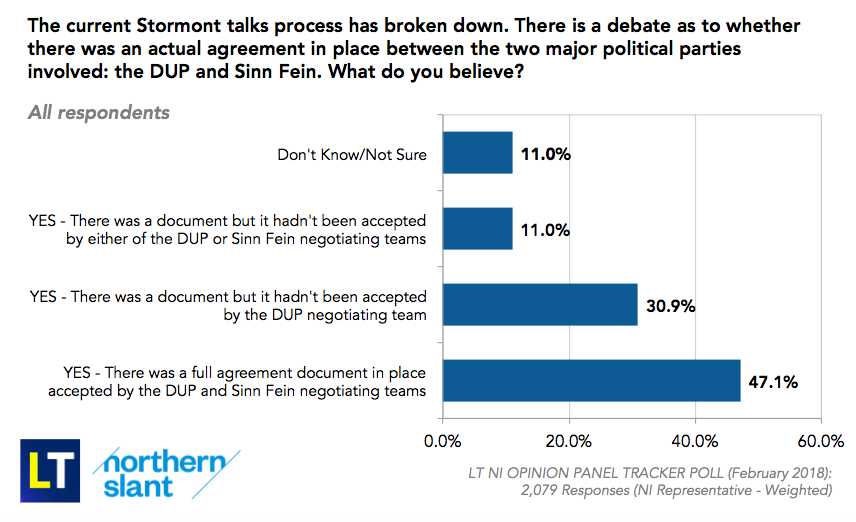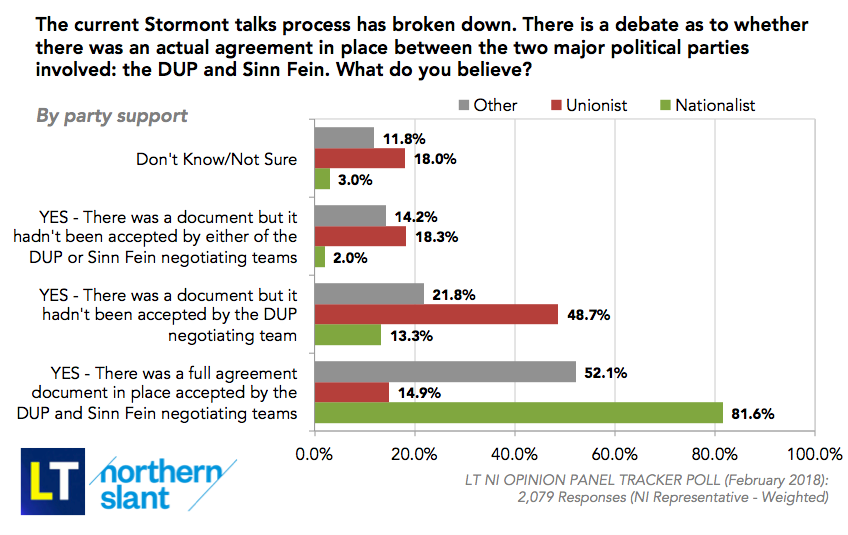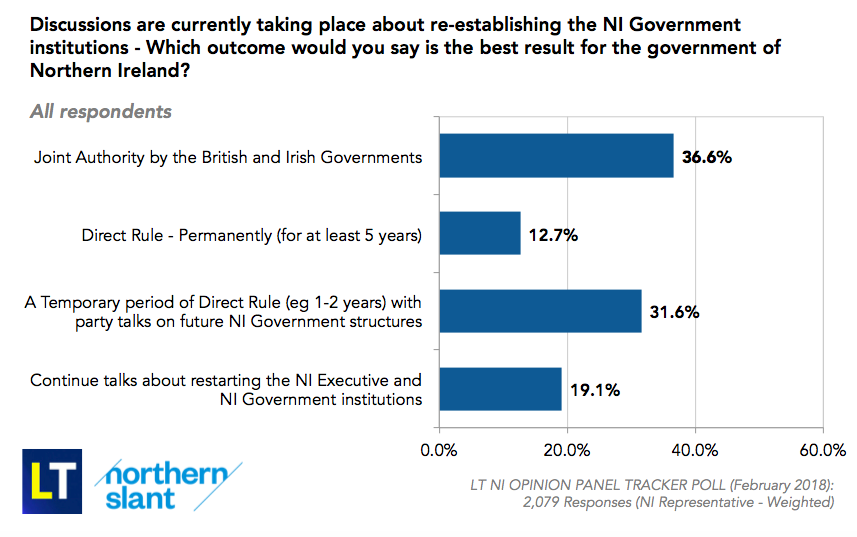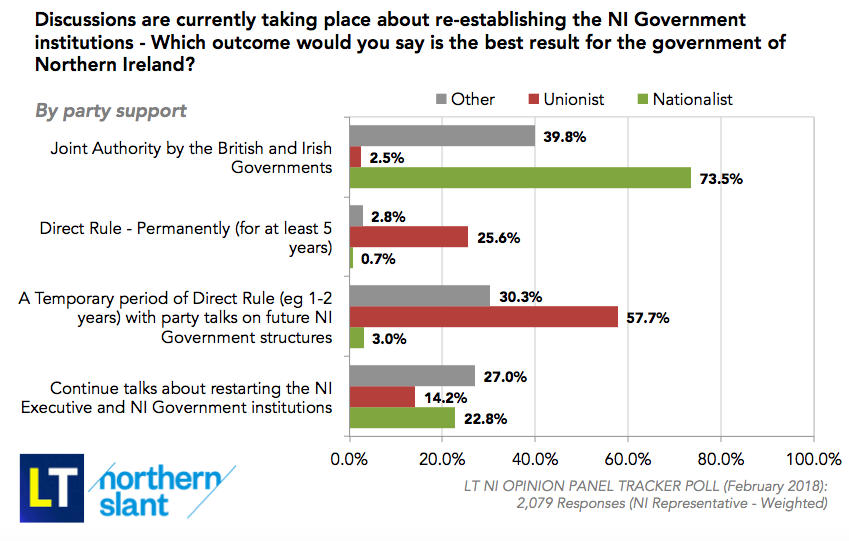This week LucidTalk have revealed the results of their February tracker poll. This is the first national poll to be conducted in Northern Ireland since October and, given all that has occurred in the past two months, it is unsurprising that the poll has picked up a sharp movement in public opinion. Yet the changes in party political support, headlined earlier this week, are just one indication of a deep change within our society.
Today Northern Slant can reveal the results of two key polling questions asked by LucidTalk – who agreed to what in February and what do the people of Northern Ireland want to see happen next?
In terms of the collapsed February deal, Lucidtalk found that 47.1% of the population believe that there was a full agreement document in place, accepted by the DUP and Sinn Féin negotiating teams. A further 11% of the population aren’t sure or don’t know if there was a full agreement, meaning that 41.9% believe the DUP’s claims that there was a document but that it hadn’t been accepted by them.
It is unsurprising perhaps, that a breakdown of these headline figures suggests that these beliefs are closely correlated to constitutional preferences. This is particularly evident amongst Nationalist voters – 81.6% of whom believe Sinn Féin ’s claim that a deal had been accepted by both parties. 52.1% of ‘other’ voters also believe this but only 14.9% of Unionist voters concur. The majority of Unionist voters (67%) believe the DUP – but there a sizeable minority (33%) who either don’t know or who believe Sinn Féin . The disparity here should be of concern to the DUP who have clearly not managed to convince their own voters to the same degree that Sinn Féin has theirs.
LucidTalk also asked what people thought should happen next – a variant on a question that it asked back in September. Back then 53% of respondents wished to see the Executive re-formed with 19.7% preferring temporary direct rule, 6.7% wanting longer-term direct rule and 20.6% wishing for joint authority.
Today we can reveal that there has been a dramatic shift in those figures with only 19% wishing to continue talks about re-forming an assembly – a decrease of 34% since September. Support for all other options has increased but the most popular option is now joint authority at 36.6% – up 16% in just five months. Support for temporary direct rule is at 31.6% (up 12%) and for permanent direct rule is now at 12.7% (up 6%).
If we break these figures down it is clear that support for devolution has nosedived across the board. Other voters are most supportive at 27% but that represents a drop of almost 34% since September. Nationalist support for devolution has fallen from 54.8% to 22.8% in the same period whilst Unionist support has fallen from 44.5% to just 14.2%. These really are very significant changes indeed.
And once again Unionist and Nationalist voters appear to be polarised in terms of their preferences. With support for devolution at a record low, Nationalist support for joint authority is now at 73.5% – up 32% since September. On the other side, 83.3% of Unionists would prefer temporary or permanent direct rule – an increase of just under 30%. Interestingly 39.8% of Other voters selected Joint Authority – up 20% since September – whilst 33% supported Direct Rule in one form or another.
All this makes for particularly sobering reading. For months now, as the negotiations continued to make little headway, the polls indicated that public support for devolution remained steadfast – a statistic that could be used to cajole our wayward politicians into staying around the negotiating table. Yet now, with the public at large no longer supporting the talks or devolution itself, that pressure has been lifted.
It seems that this has already dawned on the DUP and Sinn Féin . In keeping with the wishes of their voters the two parties will likely continue to focus on agitating for direct rule and joint authority respectively and will face little pressure from their bases to do otherwise. Indeed the polarisation of voters will likely continue as the dying embers of devolution fade and the remaining supporters of devolution change their preferences. Other voters in particular will be interesting to observe – will they continue to move towards supporting joint authority or direct rule? Only time will tell.
Ultimately there is a real sense that we reached a very significant moment in Northern Ireland’s history – a month shy of the 20th anniversary of the Good Friday Agreement. The hopes and aspirations of our people, expressed in the referendum of 1998, appear to have been replaced by suspicion and frustration, whilst the fudged constitutional compromise represented by devolution has been torn apart. Brexit, SpAds, RHI, crocodiles, collapsed deals, a lack of respect and a tendency towards cynicism and whataboutery all carried us towards this point – but now there’s no telling where we go from here.
Further coverage of LucidTalk’s latest poll on Northern Slant
- ‘Why the DUP and Sinn Féin don’t want to compromise’ by Jamie Pow
- ‘How much do we trust politicians?’ by Roger Greer
Methodology, and more on LucidTalk
Polling was carried out by Belfast based polling and market research company LucidTalk.
Polling was carried out by Belfast based polling and market research company LucidTalk. The project was carried out online for a period of 80 Hours from 1pm 23rd February 2018 to 9pm 26th February 2018 (80 Hours). The project targeted the established Northern Ireland (NI) LucidTalk online Opinion Panel (10,387 members) which is balanced by gender, age-group, area of residence, and community background, in order to be demographically representative of Northern Ireland.
3,131 full responses were received, and a data auditing process was carried out to ensure all completed poll-surveys were genuine ‘one-person, one-vote’ responses, and also to collate a robust and accurate balanced NI representative sample. This resulted in 2,079 responses being considered in terms of the final results – the results presented in this report. All data results have been weighted by gender and community background to reflect the demographic composition of Northern Ireland resulting in 2,079 responses being considered in terms of the final results. All data results produced are accurate to a margin of error of +/-3.0%, at 95% confidence.
LucidTalk is a member of all recognised professional Polling and Market Research organisations, including the UK Market Research Society (UK-MRS), the British Polling Council (BPC), and ESOMAR (European Society of Market Research organisations).
For more information, visit www.lucidtalk.co.uk and follow @LucidTalk on Twitter.




